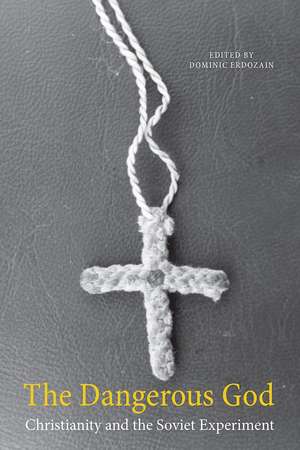The Dangerous God: Christianity and the Soviet Experiment: NIU Series in Orthodox Christian Studies
Editat de Dominic Erdozainen Limba Engleză Paperback – 2 oct 2017
At the heart of the Soviet experiment was a belief in the impermanence of the human spirit: souls could be engineered; conscience could be destroyed. The project was, in many ways, chillingly successful. But the ultimate failure of a totalitarian regime to fulfill its ambitions for social and spiritual mastery had roots deeper than the deficiencies of the Soviet leadership or the chaos of a “command” economy. Beneath the rhetoric of scientific communism was a culture of intellectual and cultural dissidence, which may be regarded as the “prehistory of perestroika.” This volume explores the contribution of Christian thought and belief to this culture of dissent and survival, showing how religious and secular streams of resistance joined in an unexpected and powerful partnership.
The essays in The Dangerous God seek to shed light on the dynamic and subversive capacities of religious faith in a context of brutal oppression, while acknowledging the often-collusive relationship between clerical elites and the Soviet authorities. Against the Marxist notion of the “ideological” function of religion, the authors set the example of people for whom faith was more than an opiate; against an enduring mythology of secularization, they propose the centrality of religious faith in the intellectual, political, and cultural life of the late modern era. This volume will appeal to specialists on religion in Soviet history as well as those interested in the history of religion under totalitarian regimes.
The essays in The Dangerous God seek to shed light on the dynamic and subversive capacities of religious faith in a context of brutal oppression, while acknowledging the often-collusive relationship between clerical elites and the Soviet authorities. Against the Marxist notion of the “ideological” function of religion, the authors set the example of people for whom faith was more than an opiate; against an enduring mythology of secularization, they propose the centrality of religious faith in the intellectual, political, and cultural life of the late modern era. This volume will appeal to specialists on religion in Soviet history as well as those interested in the history of religion under totalitarian regimes.
Din seria NIU Series in Orthodox Christian Studies
-
 Preț: 231.11 lei
Preț: 231.11 lei -
 Preț: 216.01 lei
Preț: 216.01 lei -
 Preț: 335.96 lei
Preț: 335.96 lei -
 Preț: 446.95 lei
Preț: 446.95 lei -
 Preț: 360.00 lei
Preț: 360.00 lei -
 Preț: 479.68 lei
Preț: 479.68 lei - 27%
 Preț: 720.93 lei
Preț: 720.93 lei -
 Preț: 336.72 lei
Preț: 336.72 lei -
 Preț: 263.72 lei
Preț: 263.72 lei -
 Preț: 466.20 lei
Preț: 466.20 lei -
 Preț: 461.72 lei
Preț: 461.72 lei -
 Preț: 412.65 lei
Preț: 412.65 lei -
 Preț: 376.72 lei
Preț: 376.72 lei -
 Preț: 417.26 lei
Preț: 417.26 lei -
 Preț: 392.41 lei
Preț: 392.41 lei -
 Preț: 436.68 lei
Preț: 436.68 lei -
 Preț: 252.14 lei
Preț: 252.14 lei
Preț: 354.24 lei
Nou
Puncte Express: 531
Preț estimativ în valută:
67.79€ • 73.61$ • 56.95£
67.79€ • 73.61$ • 56.95£
Carte tipărită la comandă
Livrare economică 23 aprilie-07 mai
Preluare comenzi: 021 569.72.76
Specificații
ISBN-13: 9780875807706
ISBN-10: 0875807704
Pagini: 277
Ilustrații: 4
Dimensiuni: 152 x 229 x 20 mm
Greutate: 0.41 kg
Ediția:1
Editura: Northern Illinois University Press
Colecția Northern Illinois University Press
Seria NIU Series in Orthodox Christian Studies
ISBN-10: 0875807704
Pagini: 277
Ilustrații: 4
Dimensiuni: 152 x 229 x 20 mm
Greutate: 0.41 kg
Ediția:1
Editura: Northern Illinois University Press
Colecția Northern Illinois University Press
Seria NIU Series in Orthodox Christian Studies
Recenzii
“This volume constitutes a significant contribution. I know of no other book that illuminates so well the spiritual longings of Russian intellectuals in the last years of the USSR’s existence.”
—Lee Congdon, author of Seeing Red: Hungarian Intellectuals in Exile and the Challenge of Communism (NIU Press, 2001)
“This thoughtful and accessible collection of articles is a valuable contribution to the growing scholarly literature on the fate of religion under communism. It will interest anyone studying the clash between religion and atheism in the twentieth century, and how spirituality evolves in response to persecution.”
—Philip Boobbyer, University of Kent
“The major contribution of the volume lies in its exploration of the ways in which faith gave meaning, a sense of freedom and dignity, to individuals living in an oppressive state.” –Russian Review
—Lee Congdon, author of Seeing Red: Hungarian Intellectuals in Exile and the Challenge of Communism (NIU Press, 2001)
“This thoughtful and accessible collection of articles is a valuable contribution to the growing scholarly literature on the fate of religion under communism. It will interest anyone studying the clash between religion and atheism in the twentieth century, and how spirituality evolves in response to persecution.”
—Philip Boobbyer, University of Kent
“The major contribution of the volume lies in its exploration of the ways in which faith gave meaning, a sense of freedom and dignity, to individuals living in an oppressive state.” –Russian Review
Notă biografică
Dominic Erdozain is a research fellow at King’s College London and an honorary research fellow at the University of Queensland. He is the author of The Soul of Doubt: The Religious Roots of Unbelief from Luther to Marx and The Problem of Pleasure: Sport, Recreation and the Crisis of Victorian Religion.
